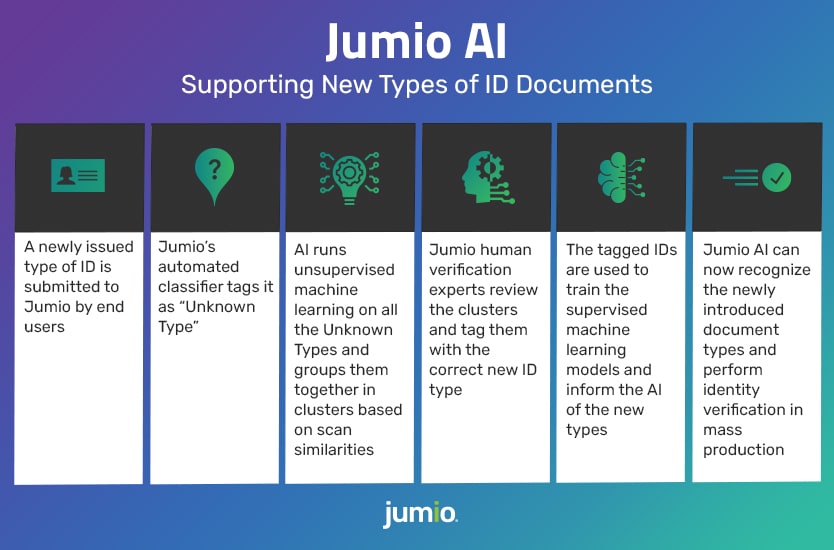
The Department of Homeland Security recently announced an extension of the REAL ID full enforcement deadline.
This means that after several postponements due to COVID-19, a U.S. driver’s license can be used to board a plane for domestic flights starting May 3, 2023, but only if it complies with the new REAL ID federal standards.
Thanks to AI, Jumio can automatically recognize and classify over 3,500 document types from more than 200 countries and territories when these documents are submitted by users for identity verification. Jumio developed this database by taking a supervised machine learning approach, where Jumio verification experts tagged millions of ID document images and Jumio engineers developed and trained AI models based on this tagged data.
But what happens when governments issue a new ID type? How can Jumio’s AI identify these new unknown ID types and correctly classify them?
Unsupervised Machine Learning
To include new and unknown ID document types and versions, Jumio first leverages unsupervised machine learning. This technology is useful when AI needs to make sense of a lot of new unstructured data with no existing data set or history. The AI is able to find patterns and create structure in the data, like grouping or clustering of similar images and ID documents, without human review.
In the case of the REAL ID, all 50 states have followed this directive and have started issuing new REAL ID-compliant driver’s licenses and ID cards. REAL IDs have a marking in the upper corner (find a photo of California’s REAL ID here). Jumio has already started supporting these existing documents and will use unsupervised machine learning to support new types of REAL ID documents in the future.
How AI and Machine Learning Can Simplify ID Recognition & Classification
How Jumio supports newly issued documents
Once a brand new type of ID document is submitted to Jumio, the Jumio AI document classifier figures out that it does not belong to any of the classes already present in its database. The ID document is not immediately processed for ID verification but is temporarily set aside and classified generically as belonging to an “Unknown Type.”
After this stage, Jumio engineering runs an unsupervised learning AI step on the “Unknown Type.” The AI creates different clusters based on similarities among the collected images. Every new cluster has documents that have strong similarities and are candidates to be accepted in the future as potential supported documents. Each new cluster created by the AI contains and represents a new ID type from a different state or country.
After this step is completed, the AI-generated clusters and the corresponding images are sent to Jumio’s verification experts. These experts review, verify and tag the new images: in this way they create new supported ID document classes based on their visual inspection of the IDs in the clusters.
As a result of this process, a new training set is created. Jumio engineering will use this new training set to train the AI models via supervised machine learning including these new ID document classes.
With the training, the model parameters are carefully tuned and optimized so that in the future AI can make automatic classification decisions. In this way Jumio’s fully automated identity verification solutions can quickly and dynamically add these new ID document types to the set of the supported documents.
If you would like to know more about Jumio AI, you can watch our AI webinar on demand here.

